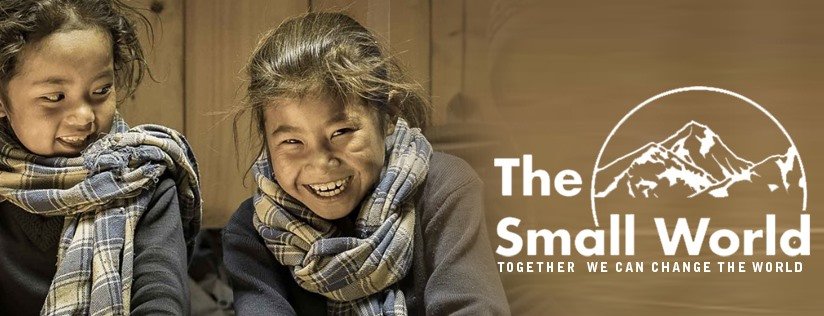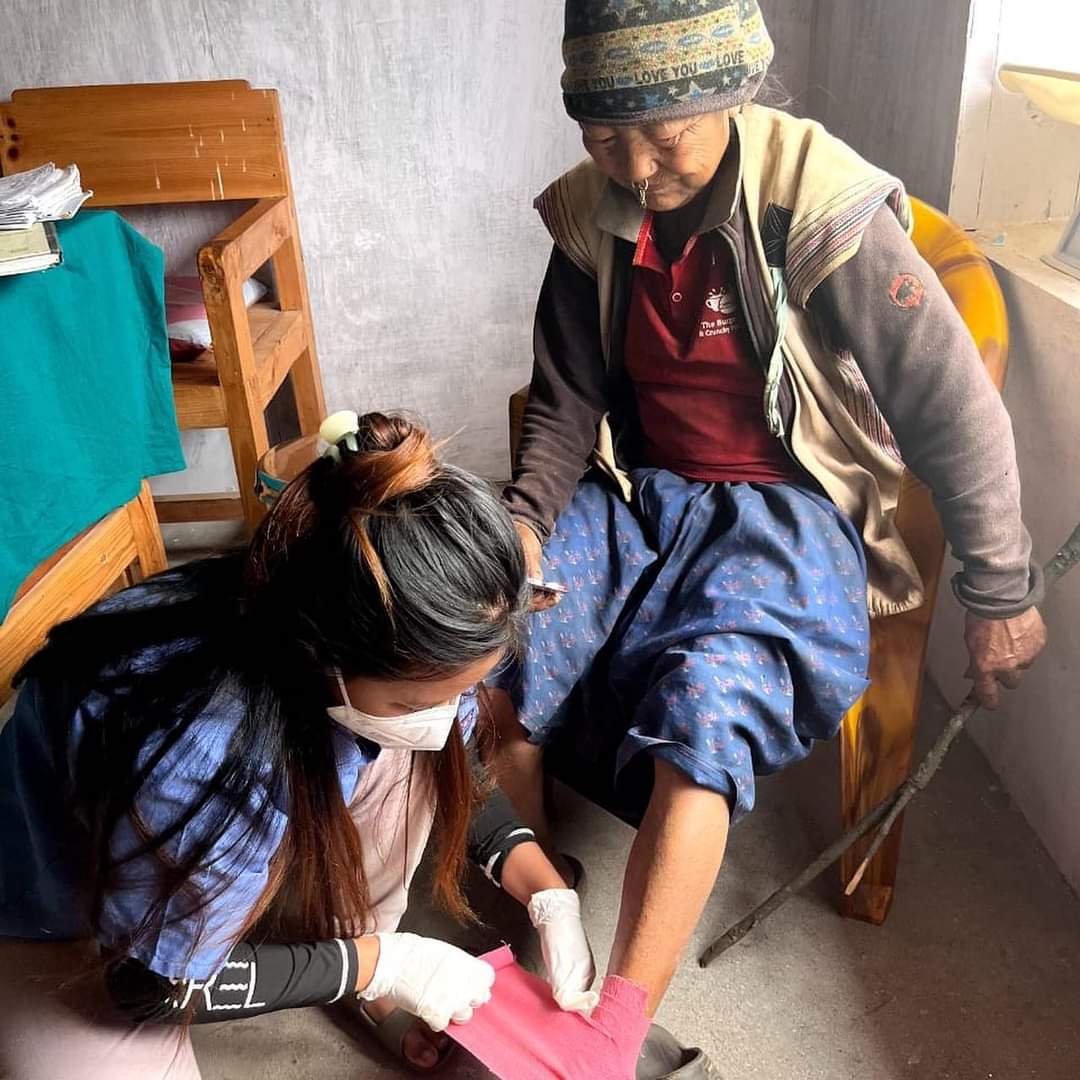Meet Shanti: Small World ’s nurse helping 1000s in Solukhumbu
At The Small World (TSW)we are absolutely convinced that educating girls not only benefits the girls themselves, but society as a whole. While our projects in Solukhumbu have been running for a little over a decade, we already have some remarkable stories of young women involved in our programs who are now pouring their time, skills, and best efforts back into their community.
One of the most striking examples we’d like to share with you is of Shanti Rai, the head nurse and person-in-charge at our Phuleli Community Health Center.
From humble beginnings…
Shanti’s life began in the remote village of Lokhim, which is about two days’ walk from Solukhumbu’s district capital, Salleri. She lived and went to school there until Grade 10, but after that, she had to come to live at TSW’s dormitory. There she had the chance to complete her last two years of school and figure out what she wanted to do with her life.
Until she joined the close-knit family at TSW she says didn’t know what she wanted to be in the future. However, while participating in our leadership and mentorship program, where girls are encouraged to find and follow their ambitions, she discovered her passion: nursing. From that day on, she felt a sense of purpose and studied diligently.
During her two years living at our dormitory in Salleri, Shanti says she made lifelong friends who became like sisters. She also learned more about the different castes, cultures, languages and religions in her home country. Over and above receiving support from TSW for her education, this time at the dorm also helped her to better understand and serve people from all walks of life in her community.
Shanti Evolves into a healthcare leader
After graduating from high school in Salleri, Shanti went on to study nursing. She’s now leading operations at the community health post in Phuleli, a facility that gives free medical services to painfully under-served communities in the area. We are so proud of Shanti and we’re in awe of how she’s grown into a role model for girls in Solukhumbu. She is a prime example of how educating girls can have far-reaching positive effects on countless people’s lives.
Nowadays, Shanti dedicates her time to serving thousands of people from small communities around Phaplu. She possesses a deep understanding of local people’s healthcare needs and is highly skilled at making the most of the available resources. Her work goes beyond diagnosing and treating patients; she also focuses on preventive care, health education, and raising awareness about important health issues. In addition, her ability to deal with emergencies without immediate access to specialized care, and her dedication to improving the health and well-being of the community, is truly commendable.
Shanti’s journey exemplifies investing in girls’ education can have a transformative effect on their lives and the lives of those around them. By receiving an education, Shanti has gained knowledge, skills, and confidence; enabling her to take on leadership roles at the health post and effectively serve those in need.
More about Phuleli Community Health Center
The Phuleli Community Health Center, which was established by TSW, officially opened its doors 15 months ago and is run by two health assistants (one of whom is Shanti) and additional support staff. The center plays a crucial role in saving lives and providing essential medical services to remote communities in Solukhumbu. Since its opening at the beginning of 2022, approximately 12,000 people from the villages of Taksindu, Waku, Basa, Kaku, Juving, and Phuleli have been served till date.
The center offers free healthcare services to local residents, with a focus on patients with conditions like asthma and hypertension who require regular follow-ups. It is also the sole provider of antibiotics in the area.
The community health center plays a vital role in addressing the clinical, public health, and awareness needs of the local community. It serves as the primary point of contact between patients and healthcare service providers. With a capacity of six beds, the center is responsible for initial assessments and decision-making regarding further treatment, or referrals to higher-level healthcare facilities. It also conducts relevant public health awareness campaigns.
Slowly but surely we are making progress, but there is still a lot of work to be done. The doctor-patient ratio and healthcare facilities in remote villages in Nepal still remain a challenge. On average, there is just one doctor for approximately every 1,724 patients, but we hope that our small efforts in educating rural populations and supporting healthcare in Solukhumbu will kickstart a widespread trend of improved access to education and healthcare across Nepal.
Residents now get life-saving preventative healthcare
Before the establishment of the Phuleli Community Health Center, many villagers had to travel long distances to reach the nearest health post in Nunthala or Salleri (for some, that meant eight hours of walking) for healthcare services. As a result, they would only visit health posts for dire emergencies, and often when it was too late. Since the establishment of the health post at Phuleli, however, local snow seek medical assistance for health issues before they become life-threatening, as well as going for regular health check-ups and follow-ups.
Besides doing her work based at the center, Shanti travels to homes in the villages to provide elderly people with health check-ups and follow-ups. She also conducts monthly meetings with pregnant women and mothers of babies under five years old. Through her, mothers get access to antenatal and postnatal care and education about good nutrition, vaccinations, breastfeeding, and safe complementary foods to improve child development and reduce health costs.
Onwards and upwards!
We can’t emphasize enough how the benefits of educating girls extend beyond the individual and has a ripple effect on the entire community. Shanti’s ability to provide healthcare services and be a voice for the voiceless demonstrates the value of educated women in addressing the needs and concerns of marginalized populations. By being educated and empowered, Shanti is able to advocate for the rights and well-being of those who may otherwise go unheard.
Her example inspires other girls and young women to pursue education and realize their own potential to bring about positive change. When girls are educated, they can become agents of progress, contributing to the social, economic, and health development of their communities.
Overall, Shanti’s story highlights the transformative power of girl education and its impact on society as a whole. Through her dedication and service, she exemplifies the positive outcomes that can result from providing educational opportunities to girls, ultimately leading to a brighter and more equitable future for all.
Full Circle of creating a better world, one child at a time.
Shanti Rai and Karma Sherpa at Phuleli health center.
Much like Shanti’s story of transforming opportunity into community service and leadership, we would also like to draw parallels between her journey and that of TSW’s Executive Director and Co-Founder, Karma Sherpa. Looking back on his path, he says he started as a boy from a poor village with a seemingly hopeless future, but since he was blessed with a life-changing education through the kindness of travelers, he was educated & empowered to not only change his own life but the lives of many others.
Inspired by the generous spirit of those who helped him, Karma has dedicated himself to giving back to his community through TSW. His story of receiving - and now giving - the gift of education has come full circle.
During a recent field visit, Karma said he took a moment to think about all that TSW has accomplished, and he started to get a bit emotional. What Shanti and over a dozen girls sponsored by TSW have already achieved as leaders in Solukhumbu is nothing short of miraculous. Some of them have become nurses, teachers, lawyers, businesswomen, and even political leaders. At this thought, Karma admitted that tears welled up in his eyes and for a moment he was rendered speechless. However, these were tears of happiness, he assured us. His tears were an outpouring of gratitude, and they reflect his growing confidence in the vision he and TSW have for creating a better world, one child at a time.
Support leaders like Shanti Rai today!
Namaste & thank you from Shanti & Karma from all of us at Small World.







